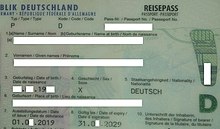| Third gender law | |
|---|---|
| German Bundestag | |
| |
| Citation | Gesetz zur Änderung der in das Geburtenregister einzutragenden Angaben |
| Territorial extent | Germany |
| Passed by | German Bundestag |
| Passed | 13 December 2018 |
| Passed by | German Bundesrat |
| Passed | 14 December 2018 |
| Signed by | President Frank Walter Steinmeier |
| Signed | 18 December 2018 |
| Commenced | 22 December 2018 (6 years ago) |
| Legislative history | |
| First chamber: German Bundestag | |
| Introduced | 1 October 2018 |
| First reading | 11 October 2018 |
| Second reading | 13 December 2018 |
| Third reading | 13 December 2018 |
| Second chamber: German Bundesrat | |
| Received from the German Bundestag | 14 December 2018 |
| Passed | 14 December 2018 |
| Summary | |
| German federal law on the enabling of a third positive gender entry | |
| Status: In force | |

Germany's third gender law introduced the gender "diverse" (German: divers) as a third positive option in alternative to "female", "male" or without an entry in the German civil status register.[1]
The law, codified in § 45b and § 22 PStG (German: Personenstandsgesetz), laid down an administrative procedure for assigning a diverse gender. It required a doctor's note confirming "a variant of sex development". The diverse gender can be assigned to people listed in the register, at birth or later in life. When individuals change their legal gender later in life, they can also change their first name.[2]
The administrative process was officially aimed at intersex people, but nonbinary people (who were not intersex) have also tried to use it, due to its manageable burden compared to the gender entry change procedure for trans people at that time (Transsexuals Act). However, the Federal Court of Justice ruled on 22 April 2020 that § 45b could not be used by a nonbinary person who was not intersex.[3]
The third gender law took effect on 22 December 2018. A bill to ease the process for transgender, intersex and non-binary non-intersex people, the Self-Determination Act, was passed on April 12, 2024, and took effect in November 2024. It completely revised § 45b PStG and standardised the regulations for trans, inter and non-binary people in a single law.[4]
- ^ "Male – Female – Diverse: The "third option" and the General Act on Equal Treatment". Antidiskriminierungsstelle. Retrieved 13 November 2022.
- ^ "Ratgeber für inter- und transgeschlechtliche Menschen". www.lsvd.de. Retrieved 2 April 2019.
- ^ "BGH verwehrt nicht-binärer Person die Streichung des Geschlechtseintrags nach § 45b PStG und verweist auf TSG – TrIQ: "Der Beschluss ist viel Kritik wert" – TransInterQueer e.V." (in German). Retrieved 14 November 2022.
- ^ "Selbstbestimmungsgesetz tritt in Kraft | Bundesregierung". Die Bundesregierung informiert | Startseite (in German). 1 November 2024. Retrieved 3 December 2024.
